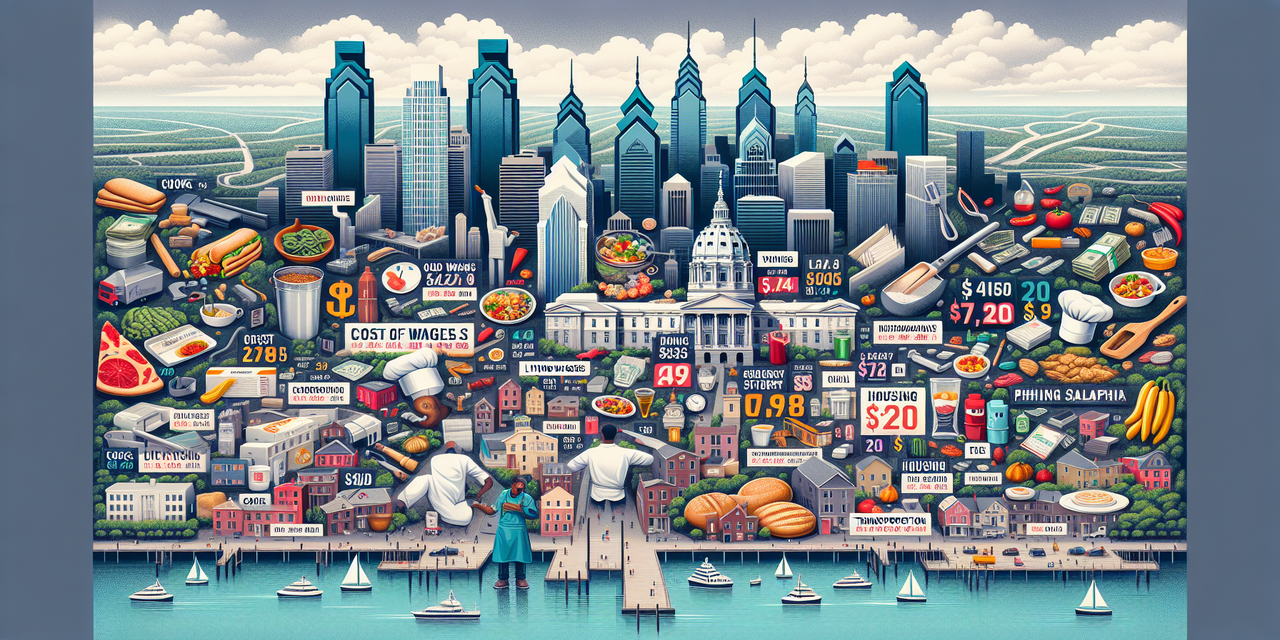Philadelphia Living Wage vs Cook Salary: Key Takeaways
- The average cook in Philadelphia earns about $15.60 per hour, roughly $39,117 annually.
- The living wage for a single adult in Philadelphia is $23.26 per hour, rising to $43.77 for a single adult with one child.
- Philadelphia's cost of living is approximately 4% higher than the national average, with housing and utilities being major contributors.
This article explores the significant wage gap between cooks' salaries and the living wage in Philadelphia using cost-of-living data to highlight challenges and potential solutions.
Understanding these financial dynamics is essential for addressing workforce stability and economic well-being in the culinary sector.
Employers looking to improve recruitment can benefit from insights on how to hire a cook, which addresses hiring challenges and effective strategies.
1. Overview of Cook Salary in Philadelphia
As of mid-2025, cooks in Philadelphia earn an average hourly wage of $15.60, which aligns closely with the national average for this occupation.
This rate translates into an annual income of approximately $39,117, with most salaries ranging from $35,524 to $46,034 depending on experience and employer.
While this income may seem adequate at first glance, when compared against the living wage and local cost of living, it becomes evident that cooks face financial strain meeting basic expenses.
For those interested in cooking careers, proper preparation is essential. Discover more about the cook career path and the qualifications needed.
2. Understanding Philadelphia's Living Wage Requirements
The Massachusetts Institute of Technology’s Living Wage Calculator provides a comprehensive estimate of what income is needed to cover essential expenses in Philadelphia.
A single adult requires an hourly wage of about $23.26 to afford basic needs such as food, housing, transportation, and healthcare without relying on government assistance.
For a single adult supporting one child, this figure nearly doubles to $43.77 per hour, reflecting the additional costs of childcare and family necessities.
Components of the Living Wage
The living wage calculation includes:
- Housing costs
- Food and groceries
- Transportation expenses
- Medical and health care costs
- Other essentials like clothing and personal care
These components collectively define the minimum wage level required to sustain a modest but decent quality of life in Philadelphia.
Employers looking to attract talent should review creating effective job descriptions to appeal to qualified candidates in the culinary field.
3. Philadelphia’s Cost of Living Factors Impacting Wages
Philadelphia’s overall cost of living stands about 4% above the national average, compounding the financial challenges for workers earning near minimum or average wages.
Among the largest cost drivers in the city:
- Median rent for a one-bedroom apartment is approximately $1,500 monthly
- Utility bills average around $220.88 per month, roughly 7% more expensive than the national norm
- Groceries cost about 4% above average
- Transportation costs, including fuel prices near $3.39 per gallon, exceed the national figures by around 5%
These factors contribute significantly to the gap between wages and actual living expenses for cooks and other lower-income workers.
Hospitality employers can learn about managing utility costs to optimize operational expenses in their establishments.
4. Bridging the Gap Between Cook Salaries and Living Wage in Philadelphia
The disparity between cooks’ earnings and the living wage signals a pressing need for strategic interventions to ensure economic security for these workers.
Several approaches can help close this gap:
Wage Increases for Culinary Professionals
Raising wages within the culinary industry to better reflect the local cost of living is fundamental.
Advocating for fair pay that extends beyond the minimum wage could reduce financial stress and improve job retention rates.
Restaurant owners might find valuable tips in the guide on how to hire restaurant staff fast, which can support efficient recruitment strategies for better wage offers.
Policy Changes to Raise Minimum Wage in Pennsylvania
Pennsylvania has maintained its minimum wage at $7.25 per hour since 2009, considerably below the living wage requirements in cities like Philadelphia.
Efforts to increase the state’s minimum wage to $15 per hour by 2026 are currently stalled in the legislature, limiting immediate relief for low-wage workers.
Renewed legislative focus and public advocacy could catalyze essential wage reforms.
Cost-Reduction Initiatives to Ease Living Expenses
Programs aimed at reducing living costs, particularly affordable housing projects and subsidies for utilities and transportation, can alleviate the pressure on workers without requiring immediate wage hikes.
Supporting such initiatives benefits not only individual workers but also broader community economic health.
For employers seeking guidance on workforce retention, the strategies to reduce restaurant employee turnover may offer useful approaches.
5. Conclusion: Addressing Philadelphia’s Wage and Living Cost Divide
Cooks in Philadelphia face a significant income gap when compared to the area’s living wage standards, intensified by above-average housing and essential costs.
Bridging this gap will require coordinated efforts involving wage increases, policy reform, and cost-of-living interventions.
Ensuring these workers can meet basic needs is vital to fostering a sustainable and equitable labor market in Philadelphia's culinary sector.
For further understanding of labor challenges, see restaurant labor shortage insights and how it affects hospitality jobs.
6. Useful Resources for Philadelphia Wage and Living Cost Information
- Explore detailed living wage data at the MIT Living Wage Calculator.
- Learn about state wage regulations through the Pennsylvania Department of Labor & Industry.
- Access local support programs and initiatives on the City of Philadelphia Official Website.


.png)

.png)
.jpg)